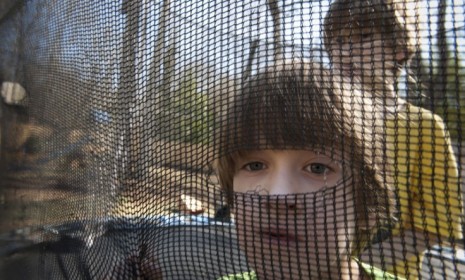Is autism linked to too many brain cells?
A new study intrigues researchers by suggesting that the brains of autistic kids are significantly heavier than the brains of healthy children

A free daily email with the biggest news stories of the day – and the best features from TheWeek.com
You are now subscribed
Your newsletter sign-up was successful
Scientists may be one step closer to unlocking the mystery of autism's origins. According to a new study published in the Journal of the American Medical Association, autism may be linked to an excess of neurons in a child's brain. "For the first time, we have the potential to understand why autism gets started," says Eric Courchesne, the study's author and a professor of neuroscience at the University of California, San Diego. Here, a guide to the findings:
How was this study conducted?
In order to comb extensively through brain tissue, researchers could only examine postmortem specimens. Thus, the study was small: The brains of seven deceased autistic children were compared with the brains of six deceased kids who didn't have autism, says David W. Freeman at CBS News.
The Week
Escape your echo chamber. Get the facts behind the news, plus analysis from multiple perspectives.

Sign up for The Week's Free Newsletters
From our morning news briefing to a weekly Good News Newsletter, get the best of The Week delivered directly to your inbox.
From our morning news briefing to a weekly Good News Newsletter, get the best of The Week delivered directly to your inbox.
And what did they find?
The autistic kids "had, on average, 67 percent more neurons — a type of brain cell and a building block of the nervous system — than boys without autism at a similar age," says Jennifer Goodwin at USA Today. These neurons were concentrated in the prefrontal cortex, which "is key to complex thoughts and behaviors, including language, social behavior and decision-making." The brains of autistic children were also found to be heavier, weighing an average of 17.5 percent more than the brains of kids without autism.
What does it mean?
Neurons are only generated during development in the womb. Thus, this study lends compelling evidence to the argument that autism has a prenatal origin — and is not something triggered during early childhood. "For the first time, we have something really solid," says Courchesne. The extra neurons in autistic kids equate to a "huge increase in potential connections and, therefore, a potential for miswiring, which would lead to abnormal function."
A free daily email with the biggest news stories of the day – and the best features from TheWeek.com
How will this discovery help the fight against autism?
In the future, brain size could "have a large impact on future autism screening." Pediatricians, for instance, might flag children with abnormally large brains as potential victims of the disease earlier than they do now, and be able to start treatment sooner.
-
 The ‘ravenous’ demand for Cornish minerals
The ‘ravenous’ demand for Cornish mineralsUnder the Radar Growing need for critical minerals to power tech has intensified ‘appetite’ for lithium, which could be a ‘huge boon’ for local economy
-
 Why are election experts taking Trump’s midterm threats seriously?
Why are election experts taking Trump’s midterm threats seriously?IN THE SPOTLIGHT As the president muses about polling place deployments and a centralized electoral system aimed at one-party control, lawmakers are taking this administration at its word
-
 ‘Restaurateurs have become millionaires’
‘Restaurateurs have become millionaires’Instant Opinion Opinion, comment and editorials of the day